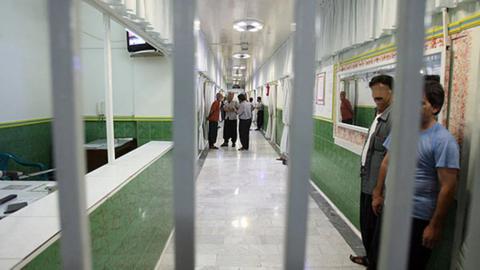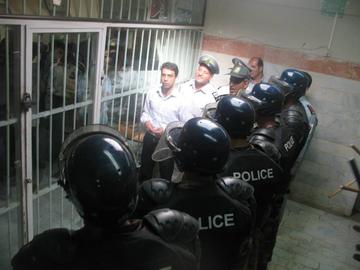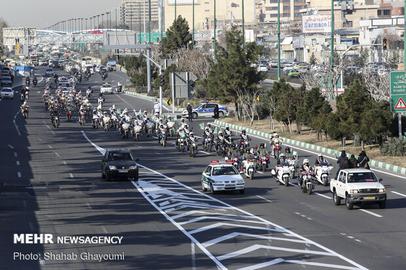Prison Narratives is a collection of reports told by prisoners. The narrators of the series are political prisoners and prisoners of conscience, as well as people who have been detained for “ordinary," non-political crimes. They talk about their lives in prison and guide the reader through the prison environment and the people they encounter. This article tells the story of two prison guards who have themselves been put behind bars after being charged with possession of drugs in late January 2021. They worked at Greater Tehran Prison, also known as Fashafuyeh Prison, and are currently being held at Ghezal Hesar Prison.
***
At the end of January, two guards working at Unit 5 of Greater Tehran Prison, also known as Fashafuyeh Prison, were arrested on charges of possessing narcotics, namely crack cocaine. They were taken to the Anti-Narcotics Department of the Tehran Intelligence Agency, and from there to Ghezel Hesar Prison. Given the large amount of drugs the two men had in their possession, it is likely that they will face long prison terms.
Prison guards are divided into three groups. Each group consists of a leader, called a "guard officer,” and two subordinates, or ”watching officers," who have direct responsibility for the control of detention centers. In each prison, a group, called the "shift head” is stationed at the entrance to the prison. The officers work shifts of 24 hours followed by 48 hours of rest. So officers report to work every other day and leave the following morning. Each day, officers record the number of inmates held in the prison, ordering them to line up at 8am to be counted. Then, each day at 5pm, the guard once again counts the prisoners. Officers are tasked with “registering” prisoners, that is, to record prisoners’ entry and exit, sending them to judicial centers, and to report on incidents and conflicts in the ward.
The officers receive the basic salary provided by the Ministry of Cooperatives, Labor and Social Welfare, along with family benefits: an amount of between three and four million tomans per month [between US$130 and $175]. Some of them are employed by the Ministry of Defense and others are employees of the Prisons and Security and Corrective Measures Organization.
The guards are classified in terms of their duties in three categories, and most prisoners who have been in correctional facilities are aware of these divisions. The so-called “training shift" refers to the strictest guard officers, who deal with prisoners’ behavior, often using violence and insulting language. The second group is dubbed the "happiness shift,” and its officers are more lenient. They are ordered to use violence when the situation at the prison is out of control. The duties of the "health shift" include accompanying prisoners sentenced to death in the last minutes of their lives; they are the people who pull the chair from under the prisoner’s foot, or who puts his hand under the guillotine, or witnesses the prisoners being whipped. Their other task is to record cases of suicide attempts, and to record the so-called "sodomy ending in conflict " and fights over drugs or deaths due to heavy drug use.
The health shift officers, who are essentially responsible for taking the life of prisoners, also have other physical control over the prisoners, including the right to search prisoners' personal belongings and beds. They act as law enforcement officers, and even as judges, issuing verdicts that result in them beating prisoners with a water pipe. And then they become saviors and take them out of their clutches to the health center.
Greater Numbers of Prisoners Held for Financial Crimes and Protests
In the last years, however, two prominent issues have created an internal challenge among guard officers: extensive detention of street protesters in January 2018, August 2018 and November 2019, as well as the imprisonment of defendants accused of economic crimes. This has led to the prison housing new inmates. In the first case, detained protesters have often been from the same neighborhoods that the guards come from, and from the lower deciles of society. The guards frequently now escort their "neighborhood kids" to the interrogation room and hear their screams from behind closed doors.
"We discuss books we read in the break periods, and join together in shedding tears for Gonabadi dervish Mohammad Salas and the wrestler Navid Afkari, who was hanged in September," one of the imprisoned guards said. "Some of us prison guards joined prisoners in celebrating the lifting of the death sentence against Amir Hossein Moradi and his friends [who were arrested during the November 2019 protests]."
The detention and trials of people accused of economic corruption have also led to a substantial new prison population. It began under the auspices of the judiciary and trials were held without financial defendants having the right to appeal. A significant number of business people have been imprisoned, resulting in a version of class relations being reproduced inside the prison. This is another issue that has been challenging for guards and prison officers.
Prison guards are now witnessing their bosses having to bow to people jailed for financial crimes. In many cases, they are warned not to be rude to these people accused of financial crimes, who have been allocated a cell with 15 beds to himself and people he has hired to help him have a more comfortable time in prison, and who are in the same ward where at least 40 prisoners sleep on the floor. This has prompted rebellion among some of the guards and turned others into servants of these rich prisoners.
Some guards who work for these rich prisoners earn several hundred thousand tomans by smuggling in prohibited items for them. In prison we have a term for these sorts of guards, these men who move prohibited items in and out of prison for money: “dogs.” We have a range of phrases referring to “dogs” and their jobs, including obvious references to what they “fetch”: cell phones, flash drives, RAM, MP3 players, prohibited food items including, kebabs, pizza, and other junk food.
But then there are the drugs, of crucial importance in the list of prohibited, smuggled items. It is impossible for drugs to enter the prison without the coordination and involvement of the higher prison authorities.
The two guards who were arrested in late January were both from Eslamshahr, a suburb of Tehran. One of them had recently lost his father and allegedly brought a 100-gram package of crack to prison to sell to support his family. The second, the father of a primary school child, brought 240 grams of crack into the prison to sell; both were exposed. "They were the right people," another guard officer told us. "They served the inmates. The intelligence, of course, knew about it. I do not know why they didn’t want him to work for them anymore. They could have been transferred, but they got stuck and may even be sentenced to life in prison. Whereas, for example, the previous boss had taken an apartment from a financial crimes prisoner in exhange for a whole cell to himself in prison. Even if we do not comply with the wishes of a particular prisoner, we will be transferred to another place for punishment or they will cause us trouble."
It would appear that guards are by and large the victims of a system that imprisons them and puts them at the service of those with wealth and power. In such a system, the dominant, powerful people jeopardize the lives and security of everyone in the name of fighting corruption and drugs. Whether it’s a prisoner or a prison guard who does not listen to orders, they all fall victim to a system that is deeply flawed.
Read other articles in this series:
Financial Criminals and Prison Guards Set Up Factories Behind Bars
Tales of Rape and Sex Slaves in an Iranian Prison
visit the accountability section
In this section of Iran Wire, you can contact the officials and launch your campaign for various problems


























comments